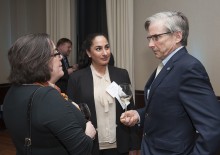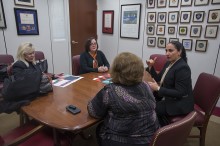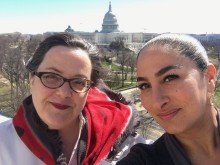Advocating on the Hill
Associate Professor of Art History Touba Ghadessi spent two days in Washington, D.C., recently, advocating for the humanities at the annual Humanities on the Hill event.
The gathering, held March 6–8, brought together delegates from state humanities councils throughout the country, to offer their voices as legislators prepare to finalize the fiscal year 2017 federal budget. Ghadessi serves on the board of the Rhode Island Council for the Humanities.
“Rhode Island has two senators and two congressmen, and they seemed convinced that the National Endowment for the Humanities (NEH) is a good thing,” Ghadessi said. “Rhode Island also has a strong voice in this discussion, since former Senator Claiborne Pell was one of the legislators who introduced the bill for the founding of the NEH to Congress, so it’s a very strong legacy. Essentially, we were there to give them ammunition so they can advocate on the floor in more effective ways.”
As someone who teaches art history, a field of humanities, Ghadessi knows well their value. She is also the co-founder of the Wheaton Institute for the Interdisciplinary Humanities (WIIH), which helps students develop professional skills while exploring interdisciplinary topics: art and medicine, technology and media, music and art history, and others.
But for many—on Capitol Hill and beyond—there is some confusion over what exactly the humanities are and what they do, Ghadessi said.
“The humanities are fields of knowledge, such as history, philosophy, literature, languages, that record and explain the human experience. They are what make us human,” she said. “It’s about culture; it’s about language; it’s about the ability to communicate.”
Among the programs funded by the Rhode Island council: a statewide reading initiative that, in 2017, highlights a memoir exploring issues within the U.S. justice system; a digital app that documents and shares information about historical sites around the state; and a series of forums tied to a local theatre performance that explore the themes of world politics, gender and power.
Ghadessi said she was fascinated by the variety of activities the NEH supports in other states as well—such as programs that help the indigenous peoples of Alaska, or that aid veterans across the country in their transition from the military to college.
A former student of Ghadessi’s, Logan Hinderliter ’14 manages grantmaking at the Rhode Island Council for the Humanities. He majored in classics and minored in art history at Wheaton, and said those subjects were essential to his professional development.
“I found that through studying the past I could better contextualize my own society and ways that we understand ourselves, as individuals, and as citizens of a democratic society,” he said. “Too often we don’t understand or empathize with others because we can’t separate our individual perspective and opinions from what is best for others or society at large. The humanities mean understanding those across the table, those across the state, across the nation, and around the world. And through understanding, we can find compromise and seek collective betterment.”
Associate Professor of Anthropology M. Gabriela Torres is co-director of the WIIH this year, alongside Associate Professor of Hispanic Studies Monteserrat Pérez-Toribio. She said the institute’s collaboration between the humanities and social sciences give students a keen insight into understanding complex issues.
“What we learn from quantifying and modeling our world is simply insufficient. Humanities teach our students that transformative ideas come from the effort of exploring diverse forms of human expression and making that creative human spirit relevant in problem solving the key issues of our world,” Torres said. “We have done this in the WIIH the last two years working on sexual assault on college campuses and queer activism.”
Despite their lobbying, Ghadessi and her colleagues at the humanities councils were expecting significant cuts to the NEH in the president’s then upcoming budget proposal. But the budget that was released March 16 eliminated NEH funding altogether.
Though that news has been discouraging for Ghadessi, she is hopeful legislators will work together to restore at least some NEH funding, and she said the humanities summit was a positive experience that gave her renewed energy in her work.
“I felt really empowered, and it was great to see the ways in which the legislative process works,” Ghadessi said. “We have to make our voices heard so that the legislative process can support those voices. If we don’t say anything, our leaders can’t do anything.”


